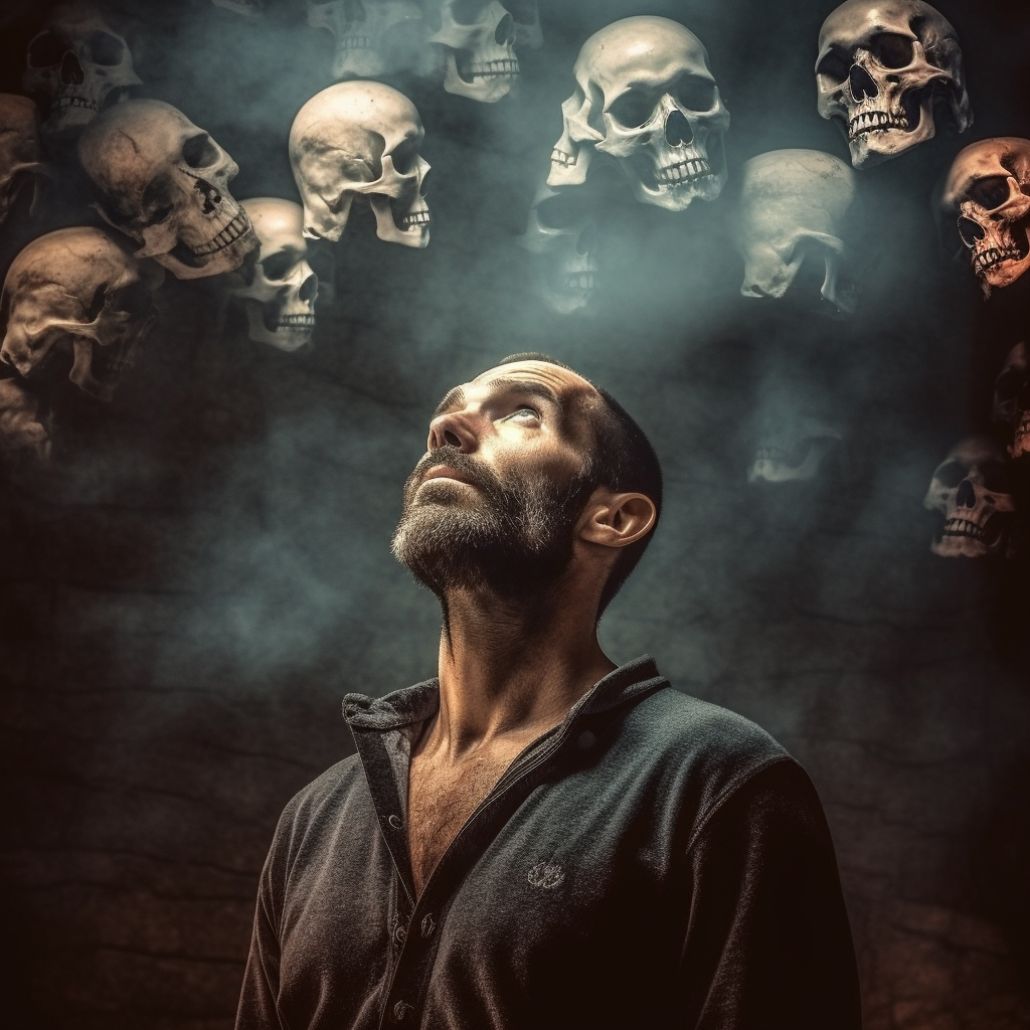Death is an enigmatic phenomenon that has captivated human curiosity since the dawn of civilization. The questions surrounding what happens when we die have intrigued philosophers, scientists, and individuals contemplating their mortality.
While religious beliefs often explain the afterlife, this article explores life after death from a non-religious standpoint. By examining scientific theories, philosophical perspectives, and cultural ideas, we delve into the mystery that shrouds the fate of consciousness after the body dies.
Death as the End of Physical Life
When the body dies, the body’s vital functions cease to operate. The heart stops beating, and the breath ceases. As the blood and brain activity diminishes, the last breath marks the culmination of a person’s earthly existence.
Once a vessel of life, the physical body is left motionless and inert. The cessation of the body’s vital functions stops the cells’ metabolic processes, ultimately leading to the irreversible breakdown of its systems.
Without functioning organs, the dead body’s temperature drops rapidly. The muscles gradually relax once engaged in constant movement and action. Blood circulation stops, depriving the organs of oxygen and nutrients. Without the supply of vital elements, the dead body’s cells deteriorate, and decomposition sets in.
The Nature of Consciousness
Consciousness, often the essence of our subjective experience and self-awareness, remains one of the most intriguing phenomena in science and philosophy.
Exploring consciousness necessitates a nuanced understanding of the relationship between the brain and subjective experience. While many theories attempt to explain consciousness, a definitive explanation has yet to be established. As such, the fate of consciousness after death remains an open question.
In the context of death, it is crucial to distinguish between brain activity and consciousness. While the brain serves as the neural substrate for consciousness during life, it does not necessarily define the limits of consciousness itself.
The brain acts as a conduit, enabling the mind to perceive, interpret, and interact with the world. However, whether consciousness can exist independently of the brain and persist beyond death is a subject of intense debate and speculation.
Near-Death Experiences (NDEs)
Near-death experiences (NDEs) have given some individuals glimpses into a realm beyond the physical world. NDEs are profound, subjective experiences that occur when a person is on the brink of death or has been resuscitated after a close encounter with death.
These experiences often involve bright light, peace, a sense of leaving the body, and encounters with deceased loved ones. While NDEs offer intriguing insights, their interpretation, and scientific explanations remain topics of ongoing debate.
Research into NDEs has revealed common elements and themes reported by individuals who have undergone such experiences. Some describe a sensation of floating above their physical bodies, observing medical interventions or events from an elevated perspective.
Others mention a profound sense of peace, unconditional love, and a detachment from the physical realm. Bright lights, tunnels, and encounters with deceased relatives or spiritual beings are also often reported.
While NDEs have the potential to provide insights into the nature of consciousness and the possibility of an afterlife, they also present challenges in terms of scientific study. NDEs are subjective experiences that are difficult to reproduce and verify objectively.
Skeptics argue that these experiences may be attributed to physiological and psychological factors, such as the effects of anesthesia, oxygen deprivation, or the brain’s response to trauma.
You may also like Reincarnation Proof: Examining the Science Behind Past Life Memories
The Mystery Beyond Death
Beyond the realm of physical existence, questions concerning the afterlife have long intrigued humanity. Cultural and religious beliefs worldwide offer diverse perspectives on what awaits us after death.
Various ancient civilizations had elaborate mythologies and concepts of the afterlife, including the Egyptian belief in the journey of the soul and the Greek notion of Hades. Similarly, Native American tribes hold views in a spirit world or ancestral realms.
In many belief systems, the concept of an afterlife is intertwined with notions of judgment, reward, or punishment. For example, in the Christian faith, it is believed that individuals will face a final judgment that determines their eternal destiny.
This judgment is based on how they lived their earthly lives, with the righteous attaining eternal life in heaven and the unrighteous facing punishment in hell.
Similarly, Islamic scripture describes an afterlife wheeeeeeere souls live in different states, including Paradise (Jannah) or Hell (Jahannam), depending on their actions in the earthly realm. Hinduism encompasses beliefs about heaven and the afterlife, with concepts such as reincarnation, karma, and moksha (liberation from the cycle of rebirth) playing central roles.
It is important to note that non-religious perspectives on the afterlife and resurrection often focus on the concept of legacy and the impact one leaves on the world. For individuals who do not subscribe to religious beliefs, the emphasis may be on making the most of the present life and leaving behind a positive and lasting influence through their actions, relationships, and contributions to society.
The Limits of Human Knowledge
As humans, our understanding of the universe and the mysteries that lie beyond is inherently limited. While science strives to uncover the truths of our existence, specific questions transcend our current comprehension—the nature of consciousness and what transpires after death falls into this realm of uncertainty.
Embracing the unknown and acknowledging the limits of our knowledge can lead to profound contemplation and humility in the face of life’s greatest mysteries.
Through disciplines such as neuroscience, psychology, and quantum physics, science has made significant progress in unraveling the workings of the human brain and the nature of consciousness. However, the study of consciousness remains a complex and multifaceted endeavor.
Reesearchers continue to explore the neural correlates of consciousness, investigating the relationship between brain activity and subjective experience. They seek to fully understand how the brain generates consciousness and whether it is possible for consciousness to exist independently of the physical brain.
Philosophical perspectives offer additional insights into the nature of consciousness and the possibility of an afterlife. Philosophers contemplate questions of identity, personal identity, and the continuity of consciousness.
They ponder the philosophical implications of near-death experiences, examining whether these experiences provide evidence for the survival of consciousness beyond death or if they can be explained by purely naturalistic means.
It is essential to approach these discussions with an open mind, acknowledging the limitations of our current scientific understanding while remaining curious and receptive to new insights and discoveries.
Pursuing knowledge and exploring the mysteries surrounding life and death continue to inspire scientists, philosophers, and individuals seeking a deeper understanding of existence.
Don't miss Uncovering the Truth about Cryptids in Illinois
Coping with Mortality
In the face of mortality, individuals often experience fear, anxiety, or existential uncertainty. Contemplating the finiteness of life can be challenging, as it forces us to confront our impermanence.
However, some research suggests that various strategies can help individuals cope with these existential concerns and find meaning and purpose in life.
One approach is to embrace the present moment and cultivate mindfulness. By focusing on the here and now, individuals can cultivate a sense of gratitude for each life experience and find meaning in the present. This mindset encourages individuals to live fully and authentically in the moment, cherishing the relationships, experiences, and opportunities in their worldly life.
Another way to cope with mortality and dying is to reflect on their legacy. Regardless of one’s belief in an afterlife, our impact on Earth and the world can have lasting effects. Individuals can create a gift that extends beyond their physical existence by engaging in acts of kindness, pursuing meaningful endeavors, and nurturing positive relationships. This approach emphasizes the importance of making a difference in the lives of others and contributing to the betterment of society.
Additionally, finding solace in mortality and fear of death can involve embracing life’s interconnectedness. Recognizing that all living beings share a common destiny can foster a sense of unity and empathy. Understanding that death is a natural part of the cycle of life can help individuals appreciate the beauty and preciousness of each moment on earth.
Some individuals may find comfort in contemplating the possibility of an eternal legacy through the collective memory of humanity. Contributions to art, literature, science, or other fields can leave a lasting impact that transcends individual mortality. Pursuing knowledge, advancing culture, and preserving wisdom can be seen as meaningful endeavors that contribute to the continuity of human experience.
Ethical Implications and Living a Meaningful Life
Ethical considerations are fundamental in shaping our lives regardless of one’s beliefs about the afterlife. Many ethical systems, whether religious or secular, emphasize the importance of leading a morally upright and virtuous existence. Our moral choices during earthly life can have profound implications for ourselves and others, shaping our present experience and potentially influencing any potential afterlife.
Non-religious ethical frameworks often center on principles such as empathy, compassion, justice, and the well-being of sentient beings. Living a righteous life, characterized by kindness, fairness, and respect for others, can be seen as an ethical imperative that enhances personal fulfillment and contributes to a more harmonious society.
Moreover, leading a meaningful life does not necessarily hinge on the existence of an afterlife. By aligning our actions with our values and pursuing activities that bring us joy, fulfillment, and a sense of purpose, we can create a life rich in meaning and significance. Engaging in charitable acts, fostering meaningful connections with others, cultivating personal growth, and pursuing endeavors that resonate with our passions can all contribute to a life well-lived.
Conclusion
The mystery of life after death and the fate of consciousness continue to intrigue and elude us. While religious beliefs offer explanations and comfort to many, exploring the concept from a non-religious perspective allows us to examine scientific theories, philosophical attitudes, and cultural beliefs. The nature of consciousness remains a subject of ongoing scientific inquiry and philosophical contemplation. By embracing the unknown, acknowledging the limits of our knowledge, and living a purposeful life, we can navigate the uncertainty surrounding death and approach it with curiosity, wonder, and a deep appreciation for the mysteries that permeate our existence.
Frequently Asked Questions About Death
Where does the soul go after death?
The soul’s destination after death is a matter of speculation and varies across different belief systems and cultures. Religious and spiritual traditions often propose diverse interpretations. Some traditions suggest the soul embarks on a journey to another realm, such as heaven, hell, or a spirit world. Others believe in reincarnation, where the soul is reborn into a new body. Non-religious perspectives may view the soul as a metaphorical or symbolic concept rather than an entity with a specific destination after death.
What happens 40 days after death?
The 40 days after death hold cultural and religious significance in various traditions. In some beliefs, such as in certain Christian and Eastern Orthodox traditions, it is believed that the soul remains in an intermediate state during this period. It is considered a time of transition and purification before the soul reaches its final destination or judgment. However, it is essential to note that the beliefs and practices surrounding this period may vary greatly depending on cultural and religious contexts.
What does the Bible say about death?
The Bible addresses death from various perspectives and offers different interpretations of how people fear death across other books and passages. In Christian theology, death is often portrayed as the consequence of sin and separation from God. However, it is also seen as a gateway to eternal life through faith in Jesus Christ. The New Testament emphasizes the concept of resurrection, wherein believers are raised to new life and reunited with God. The Bible’s teachings on death encompass judgment, redemption, and the hope of eternal life.
How long can someone hear after they die?
Determining how long someone can hear after death is a complex question, as it depends on various factors, such as the cause of death and the physiological changes that occur in the body. Scientifically, it is generally accepted that once the body dies and the brain ceases to function, the senses of the subtle body, including hearing, also cease to operate. However, there have been reports of individuals claiming to have auditory experiences during near-death experiences or other extraordinary circumstances. These accounts are subjective and often difficult to verify through scientific means.
Related Article Exploring Near-Death Experiences Through Books – Learn More About NDEs Today!
Where do we go after death?
The destination after death is a subject of much speculation, belief, and cultural variation. Different religious and spiritual traditions propose various possibilities, including an afterlife realm, reincarnation into a new body, or the dissolution of individual consciousness into a larger cosmic consciousness. Some traditions emphasize concepts such as god, heaven, hell, paradise, purgatory, or realms specific to each individual’s spiritual evolution. Non-religious perspectives often regard death as the end of individual existence, where consciousness ceases to exist.
Does a person know when they are dying?
The awareness of impending death varies among individuals and can be influenced by factors such as the person’s medical condition, terminal illness, and personal experiences. Sometimes, individuals may have a sense or intuition that death is approaching. This can manifest as a heightened awareness of their deteriorating health, a feeling of impending transition, or a desire to reconcile with loved ones. However, it is essential to note that not all individuals are conscious of their impending death, as the dying process can differ significantly from person to person.
Where does your energy go when you die?
In scientific terms, when a person dies, the energy within the body is transformed rather than simply disappearing. The body’s stored chemical energy is released through various processes, such as decomposition and the breakdown of organic matter. This energy is then recycled back into the ecosystem through natural cycles, contributing to the nourishment of other organisms and the continuation of life.
From a spiritual or metaphysical perspective, beliefs differ regarding the energy’s or consciousness’s fate immediately after death. Some spiritual and metaphysical beliefs propose that the energy or consciousness of an individual may continue to exist in some form or merge with a more incredible cosmic energy or universal consciousness. Others suggest that the energy dissipates and returns to the universal energy pool, no longer associated with individual identity.
It is important to note that discussions about energy in life after death often involve philosophical and metaphysical concepts that extend beyond the scope of empirical scientific investigation. Beliefs about the fate of energy after death can vary greatly, influenced by cultural, religious, and personal perspectives.
While these answers provide an overview of different perspectives, it is crucial to recognize that beliefs about death and the afterlife are deeply personal and can vary significantly across individuals and cultures. The mysteries surrounding life after death continue to elude definitive answers, leaving room for diverse interpretations, philosophical contemplation, and personal beliefs.



